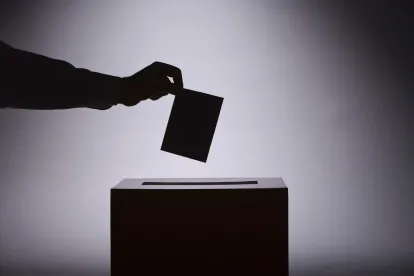Every election, months before an official candidate is nominated, the names of potential vice presidents are floated around. For each presidential candidate there are different factors to consider, and over the years the role of the vice president seems to have changed. This podcast, featuring Vincent C. Immel Professor of Law Joel K. Goldstein, will explore what the future holds for the candidates and for the office itself.
Corie:
I’m Corie Dugas. Thanks for joining us. We have Professor Joel Goldstein, the Vincent C. Immel Professor of Law and highly respected scholar on the Vice Presidency. Today we will explore what the future holds for the candidates and for the office itself. Welcome to the show Joel.
Joel:
Hi, Corie.
Corie:
Well to start things off, can you give the listeners a refresher on the important responsibilities of the vice president once elected?
Joel:
The constitution gives the vice president two responsibilities. He or she is the president of the Senate and is the first successor in case of a death, resignation, removal or disability of the president. But, in fact, that doesn’t really describe very well what the modern Vice President does. The Vice President rarely presides over the senate. Instead, ever since Walter Mondale was Vice President in 1977, the vice presidents become a highly important, engaged, involved member of the Executive Branch, who works closely with the president in the White House, is a close presidential advisor, and takes on assignments from the president.
Corie:
Ok, so now that things have sort of changed since Mondale, what makes a good vice president?
Joel:
It’s a difficult job because for a vice president to be successful, he has to have a good relationship with the president. He has to add something substantive to the administration that it needs, whether it’s the ability of a spokesperson, or as a diplomat or a congressional liaison. But, really a vice president has to be both a leader and a follower. A vice president has to be able to deal with world leaders and congressional leaders as an equal, but also has to be able to operate in a situation where he or she isn’t the decider; rather they’re implementing what somebody else has decided.
Corie:
So we’re really amping up into the election season. In general, what are the presidential candidates that we have out there looking for in a potential vice president?
Joel:
The basic things that a presidential candidate looks for in a vice president is somebody at the least who hopefully can help them improve their chances of being elected, but who at least won’t hurt them. They don’t want the vice president to become a major drag on their candidacy. So there’s an elaborate vetting process that takes place to see, to examine the potential vice presidential candidates in detail. Find out everything about their lives. Joe Liebermann said that it was like having a colonoscopy without an anesthesia. So they do this to try and eliminate candidates who will have negative baggage that will hurt the ticket. But they usually are looking for somebody who could at least provide or who could hopefully provide some boost. Sometimes it’s a question of picking somebody who could help unify the party. Sometimes it’s helping them with a demographic where they’re weak or where they’re a part of the party or the constituency where the presidential candidate is weak.
Corie:
Are there any particular personality characteristics that you think are important for a vice candidate?
Joel:
Well vice presidential candidates I think needs to be presidential. There’ll be a debate of probably 90 minutes where the vice presidential candidates and if you’re a presidential candidate, you don’t want to be sitting watching that debate as your campaign goes down the tubes because people see that you’ve put somebody potentially a heartbeat away from the presidency who doesn’t belong there. Moreover, you want somebody who is presidential because who you choose as vice president is often sort of the first presidential decision that a presidential candidate makes. So it’s sometimes viewed as sort of a test on how good of a decision maker somebody is. The other thing you need in a vice presidential candidate is somebody who is a good follower. Somebody who will recognize that two greats they’re being given a plan, a script and they need to follow it. They’re not the person who gets to dictate strategy. They help implement a strategy that others have set.
Corie:
So, if the vice presidential candidates are followers, which seems that that is really important and that makes perfect sense, can they really be influential in the policy that’s presented in the campaign?
Joel:
Well they can be in some respects. I mean, they can be influential with the presidential candidate and his or her advisors to the extent that they’re respected by the presidential candidate. I mean for instance when Michael Dukakis chose Lloyd Benson, Dukakis and Dukakis’s top aides really grew to respect Benson a lot and sometimes Dukakis’s aids would even go to Benson and ask Benson to say things to Dukakis as a way to persuading him. But they also can be influential in the campaign, to the extent that they’re an effective sales person for the presidential candidate, to the extent that they are good at articulating themes that the campaign wants to get across. In 1960, when John Kennedy was running for president, he was attacked on the ground that he was Catholic. Lyndon Johnson very effectively went through the south and would talk about JFK’s war record and the war record of John F. Kennedy’s brother who was killed in World War II, and would say that when those young men went out to fight for their country, nobody asked what religion they were. And so a vice presidential candidate who is an effective messenger and an effective articulator of the themes that the campaign wants to get across can also be influential in the campaign.
Corie:
So you’ve listed a number of characteristics and given some great examples of some excellent vice presidential candidates and what they’ve helped the presidential candidates with. What do you think are some of the names that we will be hearing on the democratic ticket in the upcoming election?
Joel:
Well it’s always a bit unpredictable until you get closer, but I think some of the people that might be considered, especially if Secretary Clinton is the nominee, would be Secretary Castro, who is the Secretary of Housing and Urban Development, and Secretary Perez, who is the Secretary of Labor – have both been widely mentioned. They are two candidates who are young – relatively new to the national scene, but are thought to be helpful in terms of mobilizing support among the Hispanic community. Senator Cory Booker from New Jersey is sort of a up and coming new member of the senate. Senator Ted Cain of Virginia was one of the ten finalists that then Senator Obama considered in 2008. He’s an influential senator from a potential swing state. Senator Sherrod brown from Ohio is another who, I think, Secretary Clinton might consider. Again, somebody who is well thought of by the more liberal wing from the Democratic Party also comes from Ohio. So I think those may be the people who will be considered on the democratic side.
Corie:
Is there any names that come to mind if Bernie Sanders moves forward as the nominee?
Joel:
Well I think that if Senator Sanders was the nominee, I think some of the same names. You would expect that he would try and strengthen himself in some of the areas where he’s been weaker. Let’s say some of the traditional democratic constituencies, African Americans, Hispanics –where he hasn’t run as well. He also would be somebody who, unlike Secretary Clinton, who doesn’t have perceived national security credential. So, he also would be looking for somebody stronger in that area. You know, where as in her case, she doesn’t really need to cover that.
Corie:
That makes a lot of sense. Is there anybody that you see potentially popping up on the Republican ticket?
Joel:
Well the Republican ticket a lot depends on who the nominee is. But one person who has been mentioned widely and who would be considered on the Republican side would be Governor Nikki Haley of South Carolina. She was the person chosen to give the response to President Obama’s State of the Union address in January. She’s supported Senator Rubio, which would mean if somebody other than Senator Rubio is the nominee she would be perceived as a bridge to that part of the party. Also is a woman and somebody who I think is perceived as an effective governor of South Carolina. She would be helpful in a race against Secretary Clinton. I think there could be some people from Donald Trump –said he would take a political insider and said Governor Haley would fit that bill. People like Senator John Thune from South Dakota or Senator John Corn from Texas might be sort of people who might be considered. It could be a long list and this point it is sort of unpredictable to say. There could some different dynamics that play out on the Republican Party that we have encountered in recent times.
Corie:
How will the naming of the Vice Presidential candidate, when we get there, change how the campaigns look?
Joel:
Well once you name one vice presidential candidate and then two vice presidential candidates, instead of the race becoming a competition between two people; it becomes a competition, in a way, between two couples. Particularly, if either of the running mates is a new face, there is almost a feeding frenzy that takes place as America is introduced to somebody new. Paul Ryan in 2012. Governor Palin in 2008. Even somebody like Senator Biden, who had been in the Senate for 36 years, have shared major committees, run for president and so forth; the level of coverage that you receive as a vice presidential nominee is well beyond anything you have ever received in any other type of political life. So there’ll be a focus of the new candidate and what that selection says about the person who selected him or her. I mean ultimately people vote based upon their preferences of the presidential candidates but how they perceive the vice presidential candidates, what messages it sends about the presidential candidates are things that some people take into account. I think those are ways in which selection changes the dynamic of the campaign. It gives us somebody new to talk about, somebody new to write about. And often times, new candidates – in which the presidential candidates have been doing this for long periods of time, I mean it is if they’re in mid-season farm. Vice presidential candidates is somebody who is selected and hasn’t been used to doing this. So, sometimes in the early stages they have committed gaffes and those create their own sort of patterns of coverage and problems for a ticket.
Corie:
And by the time we get to the naming of Vice Presidential candidates, we’ll have been with months and months of hearing of hearing form the presidential candidates, so it might be fresh new voices in there as well. In the recent elections, have you seen any examples of vice presidential candidate that have stood out as good picks that have really helped elevate the presidential candidate?
Joel:
Well, I think there have been a few. I think that, depending on how far back one goes, in 1976, I think that pretty clearly that Jimmy Carter would not have been elected if not have been for Mondale’s role in the campaign. And in the vice presidential debate, Mondale helped Carter in a couple of decisive states. I think that in 1992, Al Gore really helped Bill Clinton reinforce the image of Clinton as a young southern democratic centrist. Gore was the same thing. So when you put the two together, the picture of the two of them, their spouses, really presented a image of change that was more powerful than just seeing Governor Clinton. I think that Dick Cheney in 2000, lent gravitas to President Bush’s candidacy. I think it was reassuring that where you had somebody who could governor, but had someone with no national security experience to be bringing on to his ticket somebody who had experience leading the defense department during the Persian Gulf War. I think the choice of Governor Palin in 2008, initially really energized the Republican base, the conservative part of the republican party who had never been enamored with Senator McCain became enthusiastic about him for the first time. Ultimately, over the course of the campaign, I think Governor Palin had some fairly disastrous interviews and so forth. Her numbers went down and she became something of an albatross for the campaign, but the initial period of selection, she really provided some energy and boost for his campaign. But one of the lessons I think is that sometimes presidential candidates choose somebody who will look good in July and August and while that may be important, ultimately it’s also important as to how they’re going to be perceived in October and November.
Corie:
Professor Goldstein also has a new book on this topic, The White House Vice Presidency: The Path to Significance, Mondale to Biden. This book is out now. So thank you so much for joining us today Joel. I hope you all had a chance to read the book. This has all been very informative and interesting discussion.
Joel:
Thanks Corie, it’s been fun.




 />i
/>i
